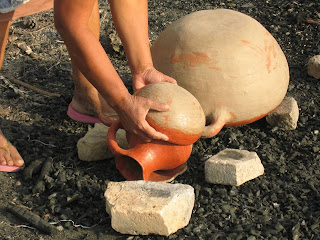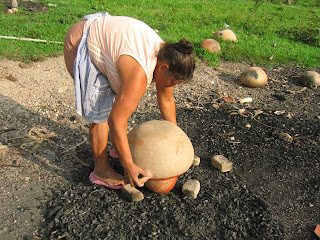
Christmas tree at my host family´s house
Christmas seemed to come up so quickly and pass by just as fast and I think part of that was just because I was not surrounded by the constant Christmas advertisements and holiday sales. I know in the bigger cities there were Christmas sales in the large superstores. But even Gracias is small enough that these don´t really exist. Also, people do not buy gifts for one another here. The most common thing is that people will buy some new clothes to wear for Christmas, but that´s about it.
I actually spent the majority of Christmas Eve in Gracias. My host dad and I were going to go to Santa Rosa de Copan (a larger city 1 ½ hours from Gracias) so I could buy a mattress, toaster oven, stove, and other things I need for when I live alone. We were going to borrow a car from a guy who lives in Gracias and so I decided to go early on the bus, run some errands, and wait there for my host dad who had a few things to do in Nueva Esperanza and then was going to catch a ride in. However, when I got into Gracias around 8 am, I found out that the guy whose car we were going to use went to La Campa to do some work. I called my host dad who told me that he had just stopped by the house and told him that he needed the car until noon and then after that we could go. Finally, around 3:30 pm my host dad shows up in Gracias where most of the stores had closed for the holiday. I had already figured we weren´t going to make it to Santa Rosa so I had made a few purchases in Gracias like a bike and pillow, but nothing from my list of stuff that I really needed. By 3:30 though, I was ready to get home.

Fresh-made bread. The secret ingredient? FANTA!
At home, I celebrated the 24th with my host family with a dinner of pork tamales and sweet bread. We didn´t have a white Christmas but we almost had a black one, in that we lost power twice for about half an hour each time. Everyone here eats pig for Christmas and when I was on the bus earlier in the day headed to Gracias, there was a man next to the road shaving the hair off a recently killed one. At night, the tradition is to light off firecrackers in the streets. I thought I would join my host brother and sisters in the road to experience the tradition. Well, I experienced that tradition for about ten minutes and that is definitely enough to last this Christmas and the next. Pretty much there were about 9 kids in the streets all in their own little world lighting the firecrackers and bottle rockets. They would light them and then throw them away from themselves but without considering if it was going nearer someone else. Some of the kids would shout if they threw one near you on accident but it was pitch black and I was freaking out that I didn´t know where they were going to explode. I got hit first by mud and then a rock when I decided that I care too much about having vision in both eyes to be able to stay out any longer.

Idania making pork tamales, (pork tamales and bread are the traditional Christmas meal)
.jpg)
Mmmmmm!!
It´s tradition to stay up until midnight, too but that is threehours past my usual bed time! I also had an exhausting day in Gracias and so while I tried to make it to midnight, I think I only made it to about 10:30. LOL.
Christmas day, everyone sleeps in and lays low. I was invited to Doña Concha´s house for breakfast of pork tamales and sweet bread. She also gave me some grapes and when she handed them to me, I seriously felt like a queen. It has been so long since I have had grapes and while they have them in Gracias, they are very expensive, about 35 lempiras a pound which is the same as a pound of beef. (That´s only $1.50 but remember I only make $6 a day, so a pound of grapes is ¼ of my daily earnings). For lunch, I went over to Ellen´s apartment and she made us pasta and a green salad. I had made some bean bread earlier and so we toasted that with garlic salt and cheese. For dessert, she had made a chocolate chip pie which was AMAZING as chocolate chips are hard to come by. There are so many times that I think if I didn´t have Ellen near me, I don´t know what I would do. We both agreed that the fact that it was about 75 degrees, dry, and dusty really didn´t help it to feel like Christmas. But it´s not like we would have a nice warm fireplace to curl up next to if it were a white Christmas so I was happy that we were at least comfortable.

Don Simeon and his family on Christmas. I like to think of them as my second family because they all have been really supportive of me here.
For dinner #1, I was invited to the house of Don Simeon, Doña Berta, and their nine kids. This family has been like a second family to me and so I was really happy to be with them for the holidays. After a dinner of pork tamales and sweet bread here (as you probably have already noticed, that´s the traditional Christmas meal) I went back to Doña Concha´s for dinner #2 of baked pork, sweet bread, beans, tortillas, and extra bread to take home in addition to the loaf she gave me at breakfast.

At Dona Concha´s for Christmas breakfast. From left to right, my friend Cindy, me, Cindy´s mom Dona Concha, some family that came to visit, and Belkis

My Christmas dinner at Dona Concha´s house: baked pig, beans, and tortillas.
I thought this year I would feel how I did last Christmas in Chile when I felt alone and sad to be away for the holidays. While I missed my family and friends this year, I was definitely not lonely and really enjoyed being here with my new friends. I had a lot of fun learning about the Christmas traditions and I can say with assurance that this was a very special and unique Christmas that I will cherish for years.
One unfortunate thing has happened this month which I hope to get fixed very soon . . . my laptop broke. I was working on my laptop on my bed and when I got up to get a notebook that I needed, it slid off and hit the floor. It landed on the charger in the back which was jammed even further inside. So now the laptop will start but then turns off almost immediately. It did make it once to my desktop and everything was the same so I know the memory is ok. But other than that I can´t do anything. Claudia talked with the man in charge of tech support at the Peace Corps office about my situation and he recommended me to a guy that he knows in Tegucigalpa. So I plan on taking it in after the new year.


















































